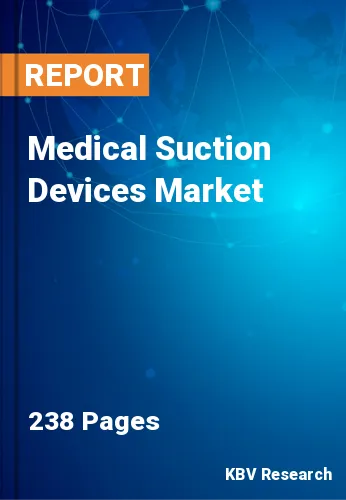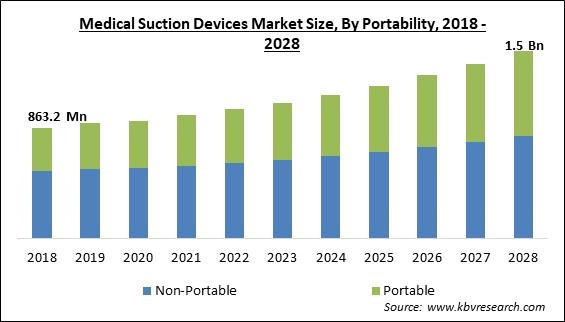
The Global Medical Suction Devices Market size is expected to reach $1.5 billion by 2028, rising at a market growth of 6.4% CAGR during the forecast period.
The primary purpose of a suction machine, an aspirator, is to clear blockages from a person's airway, such as mucus, saliva, blood, or secretions. Suction machines assist breathing by keeping the airway free when a person cannot expel secretions because of unconsciousness or when going through a medical treatment.

When a patient's airway is partly or fully blocked, healthcare practitioners, employ suction devices as a crucial component of a therapy strategy. Among the frequent uses are: respiratory secretions when the patient can't remove them, helping a patient who is vomiting and seizing or who is comatose clearing the airway of blood and taking anything alien out of a patient's lungs or windpipe (pulmonary aspiration).
Aspirators have established themselves as a standard in pre-hospital and in-hospital settings due to their versatility in treating several life-threatening disorders when combined with other medical technology. Considering their pervasiveness, concerns concerning their purposes and operations are frequent. Suction Machines are utilized when patients have liquid or semi-solid obstructions in their pharynx, trachea, or other oral canals. Yet, a patient's condition may affect the best suction device.
A few situations in which clients or experts could make use of a portable suction device are continued medical care, if a patient cannot remove their secretions for several reasons, they may need portable suction equipment at home. This includes persons with chronic diseases (COPD, ALS, cystic fibrosis, bronchiectasis, etc.), those who have had a tracheostomy, or palliative care patients who find it difficult or impossible to remove their secretions.
During the pandemic, growth in regulatory product approvals for medical suction devices assisted several market participants in growing their product sales. As the pandemic spread, there was a surge in the use of suction equipment by COVID-19-infected patients in the ICU, leading to market expansion. Furthermore, for ICU patients with an artificial airway, closed tracheal suctioning systems (CTSS) were also necessary. Hence, the market saw slight decrease during the initial period of the pandemic but due to the recommendation of medical suction devices for COVID-19 ICU patients and the resume of elective operations because of the lifting of the restriction, aiding the market to recover and grow significantly.
Chronic obstructive pulmonary disease (COPD) is a widespread, preventable, and curable, chronic lung illness affecting both men and women globally is a chronic obstructive pulmonary disease (COPD). Because of irregularities in the lungs' small airways, airflow into and out of the lungs is limited. There are several reasons why the airways close. For example, lung tissue may be damaged, mucus may block the airways, and the lining of the airways may swell and become irritated. The increasing cases of COPD globally will increase the requirement for medical suction devices, boosting the market growth.
Hearing loss, cataracts, refractive errors, back and neck pain and osteoarthritis, chronic obstructive pulmonary disease, diabetes, depression, and dementia are common ailments among older adults. In addition, people are more prone to many ailments at once as they age. Another aspect of becoming older is the increased geriatric syndromes, a group of complex medical problems. These symptoms often come from other underlying disorders, including delirium, stumbling, weakness, urine incontinence, and pressure ulcers. The growing geriatric population is expected to surge the requirement for medical suction devices as they are more likely to have illnesses requiring these devices, driving the market growth.
There are many ways that suctioning might result in hypoxia. Secondly, suctioning may not stop hypoxia if it is unsuccessful. That is why it is essential to use an efficient method and never to do suction for more than a few seconds. Suctioning may, in some instances, also activate the vagus nerve, resulting in bradycardia and hypoxia. The act of suctioning alone might result in hypoxia. Airway obstructions might take the shape of the suction tube. The danger of hypoxia is considerable if the patient is not oxygenated and the tube is not swiftly removed.
Based on portability, the medical suction devices market is segmented into portable and non- portable. The non-portable segment dominated the medical suction devices market with maximum revenue share in 2021. This is because of the increase in the number of hospitals and clinics. These gadgets are primarily utilized in dentist offices, hospital settings, and other healthcare institutions where patients are unlikely to require transport. In addition, the demand for non-portable suction equipment, emergency cases, and surgical procedures is anticipated to rise.

On the basis of vacuum systems, the medical suction devices market is divided into manual, electrically powered and venturi. The manual segment procured a substantial revenue share in the medical suction devices market in 2021. This is because they do not need power and may be as basic as a portable bulb for clearing a child's nasal passages of mucus. They're often utilized in emergencies since they don't need power and are typically lightweight and portable. To produce a vacuum, these devices usually function by squeezing a pump. They often have big canisters connected to them.
By end-use, the medical suction devices market is classified into respiratory, gastric, wound suction, delivery rooms and others. The gastric segment garnered a prominent revenue share in the medical suction devices market in 2021. This is because there is an increase in the use of these devices in gastric suction to alleviate pressure from obstructed intestines or to remove poisons, hazardous compounds, or overdosed medicines from the stomach. Also, there is a rising number of hospital admissions and technology improvements. The technological advancements and the increasing number of gastric cases are anticipated to drive the segment's expansion in the projected period.
On the basis of application, the medical suction devices market is divided into surgical, airway clearing and others. The medical suction devices segment generated the highest revenue share in the medical suction devices market in 2021. This is owing to their usage during and after surgery to remove surgical fluids, tissue (including bone), gases, and body fluids. Suction is utilized during surgery to provide the physician with a clear working area. Also, suction equipment that has been specially modified may be used for other treatments, such as pleural drainage, wound healing, and gastrointestinal drainage.
| Report Attribute | Details |
|---|---|
| Market size value in 2021 | USD 958.5 Million |
| Market size forecast in 2028 | USD 1.5 Billion |
| Base Year | 2021 |
| Historical Period | 2018 to 2020 |
| Forecast Period | 2022 to 2028 |
| Revenue Growth Rate | CAGR of 6.4% from 2022 to 2028 |
| Number of Pages | 238 |
| Number of Table | 450 |
| Report coverage | Market Trends, Revenue Estimation and Forecast, Segmentation Analysis, Regional and Country Breakdown, Companies Strategic Developments, Company Profiling |
| Segments covered | Portability, Vacuum Systems, Application, End-use, Region |
| Country scope | US, Canada, Mexico, Germany, UK, France, Russia, Spain, Italy, China, Japan, India, South Korea, Singapore, Malaysia, Brazil, Argentina, UAE, Saudi Arabia, South Africa, Nigeria |
| Growth Drivers |
|
| Restraints |
|
Region-wise, the medical suction devices market is analyzed across North America, Europe, Asia Pacific, and LAMEA. The North America region led the medical suction devices market by generating the maximum revenue share in 2021. This is owing to easy access to cutting-edge technology and the widespread use of suction devices in managing chronic respiratory disorders and other surgical operations. Also, due to the high prevalence of fatal injuries and chronic medical illnesses, many nations have experienced a rise in hospital admissions and ER visits in recent years. There is a greater acceptance rate of these devices in the home care services sector and a rise in healthcare institutions. These features are anticipated to boost the market's expansion in the region.
Free Valuable Insights: Global Medical Suction Devices Market size to reach USD 1.5 Billion by 2028
The market research report covers the analysis of key stake holders of the market. Key companies profiled in the report include Allied Healthcare Products, Inc., Precision Medical, Inc., INTEGRA Biosciences AG (INTEGRA Holding AG), ATMOS MedizinTechnik GmbH & Co. KG, ZOLL Medical Corporation (Asahi Kasei Corporation), Amsino International, Inc., Olympus Corporation, Welch Vacuum (Ingersoll Rand, Inc.), Laerdal Medical Limited, and Labcoco Corporation.
By Portability
By Vacuum Systems
By Application
By End-use
By Geography
The global Medical Suction Devices Market size is expected to reach $1.5 billion by 2028.
Expanding old age population are driving the market in coming years, however, Issues associated with suctioning restraints the growth of the market.
Allied Healthcare Products, Inc., Precision Medical, Inc., INTEGRA Biosciences AG (INTEGRA Holding AG), ATMOS MedizinTechnik GmbH & Co. KG, ZOLL Medical Corporation (Asahi Kasei Corporation), Amsino International, Inc., Olympus Corporation, Welch Vacuum (Ingersoll Rand, Inc.), Laerdal Medical Limited, and Labcoco Corporation.
The Electrically Powered segment acquired maximum revenue share in the Global Medical Suction Devices Market by Vacuum Systems in 2021 thereby, achieving a market value of $856.4 Million by 2028.
The Respiratory segment is leading the Global Medical Suction Devices Market by End-use in 2021 thereby, achieving a market value of $449.9 Million by 2028.
The North America market dominated the Global Medical Suction Devices Market by Region in 2021, and would continue to be a dominant market till 2028; thereby, achieving a market value of $537.9 Million by 2028.
Our team of dedicated experts can provide you with attractive expansion opportunities for your business.
